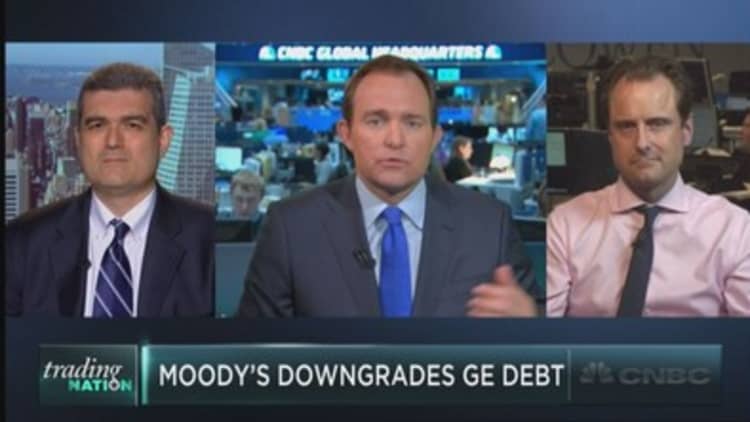
Bold corporate moves are threatening to put stockholders and bondholders at odds.
Stock investors cheered General Electric's restructuring and buyback maneuver, sending its shares sharply higher after the conglomerate announced Friday it would sell off its GE Capital business and buy back as much as $50 billion worth of stock. But the reaction in the fixed income world was a bit different.
Moody's downgraded GE's debt to A1 from Aa3 on the move, with the credit rating agency complaining of "more aggressive financial policies."
"The downgrade reflects our perception of a growing level of financial risk tolerance, in favor of equity holders and at the expense of creditors," a Moody's analyst said in a press release.
Standard & Poor's, the other major credit rating agency, maintained an AA+ rating for GE's debt.
The risk of GE defaulting on its debt is de minimis. Indeed, the cost of insuring GE's debt actually plunged on Friday as the stock soared. But the broader point that Moody's is making is that the recent trend of buybacks, rich dividends and shareholder-friendly restructuring maneuvers is putting bondholders at a disadvantage.
"If you think about balance sheets as a whole, corporate leverage is growing because you're buying back stock and you're paying dividends and selling debt to do those things. And that financial engineering is creating more corporate risk," said Larry McDonald, head of U.S. strategy with Societe Generale's macro group.
U.S. investment-grade corporate bond issuance for the first quarter hit an all-time record of $342 billion, according to Thomson Reuters. That's 8 percent above issuance in the first quarter of 2014.
Much of that money was used for buybacks. TrimTabs reports that S&P 500 company buyback programs in the first quarter rose to $219 billion, the highest level since the fourth quarter of 2007.
For Boris Schlossberg of BK Asset Management, these maneuvers make sense given the current risk-reward dynamics.
With no major corporate defaults in recent memory, "the hit to the bondholders is minimal, while the upside to the shareholders is significant," Schlossberg said.
But of course, defaults are rare when the economy is on the upswing as it is now, and upswings don't last forever.
"The only reason we haven't seen a real blowout is that the economy has held up," McDonald said. "The warning signs are there, but people never listen until it turns."
Want to be part of the Trading Nation? If you'd like to call into our live Monday show, email your name, number and question to TradingNation@cnbc.com.






